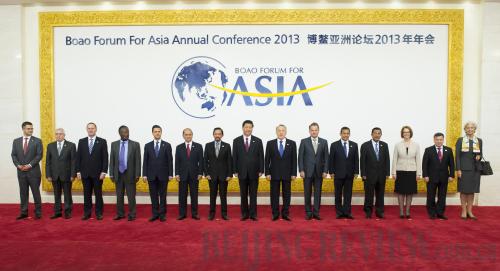|
 |
|
GATHERING OF MINDS: National leaders and heads of international organizations pose for photos at the Boao conference (LI XUEREN) |
The need to spend
There has been a growing outcry for China to further tilt the nation toward domestic consumption in order to help a sluggish global economy recover. In its 12th Five-Year Plan (2011-15), China vowed to shift its growth model toward boosting domestic consumption, as shrinking world demand for Chinese goods hurts exports. Domestic consumption only accounts for 48 percent of China's GDP, much less than the global average of 80 percent. This means a huge market is begging to be tapped.
"China is one of our biggest markets in the world, with an enormous growth prospect," said Carlos Brito, CEO of the Anheuser-Busch InBev, a leading global brewer, at the panel discussion. "Right now the beer consumption is quite low, and we see this as a great opportunity. Also, we noticed that China is a vast nation with huge regional differences. Right now, most of our business happens in coastal cities. In the future, we will focus more on inland cities and the western part of the nation."
Zein Abdalla, President of PepsiCo, echoed Brito, noting that Pepsi has performed well in China.
"We expand our presence in the Chinese market by customizing to the unique needs of Chinese consumers. For instance, by developing relatively light-tasting chips like the cucumber potato chips," he said, adding that the company will continue to develop product portfolios catering to local stomachs.
"We have a long commitment to and confidence in the Chinese market."
Lai Xiaomin, Chairman of China Huarong Asset Management Co. Ltd., said at the BFA that China should establish a long-term plan to shore up consumption.
First, China should make more effort to better distribute its wealth by increasing residents' income. Second, a better social welfare and security system should be built to make people feel secure enough to spend. Finally, more incentives should be given to consumption in rural areas. "Without stirring up consumption of the country's 740 million rural residents, China's domestic consumption can never be a pillar for economic growth," he said.
Online shopping and credit consumption have become two driving forces to increase spending at home, said experts. There had been about 242 million online shoppers in China by the end of 2012, an increase of 25 percent over the previous year, according to the China Internet Network Information Center.
Emarket, a U.S. research company, said online sales in China were worth $181.6 billion last year.
In China's first-tier cities such as Beijing and Shanghai, the yearly spending of each online shopper averaged 6,819 yuan ($1,101), accounting for 18 percent of the person's total disposable income, according to a report by McKinsey Global Institute, the research arm of global management consulting firm McKinsey & Co. China's e-tailing market may reach $420 billion to $650 billion in sales by 2020, according to the report.
Online shopping has a clear incremental effect on overall consumption, and could raise private consumption by an extra 4 to 7 percent by 2020, said Chen Yougang, one of the authors of the report.
"China's young generation is quite familiar with digital products and has been fully exposed to the Internet world since they were born. We should provide more e-commerce channels for them to get to know our brand and then purchase our products online," said Pepsi President Abdalla.
Another means to boost consumption is the credit card. Ma Weihua, President and CEO of the China Merchants Bank, said that credit consumption will play a pivotal role in shoring up spending.
"China now has 330 million credit cards, with an annual increase of 20 percent. China Merchants Banks has issued 40 million to 50 million of them, and the credit card business is spiraling up," he said.
"When I first considered developing the credit card business, many people wanted to talk me out of it. Luckily, I didn't listen to them. We estimated that it would take eight years before the business turned a profit. It turns out it only took four," Ma added.
| 